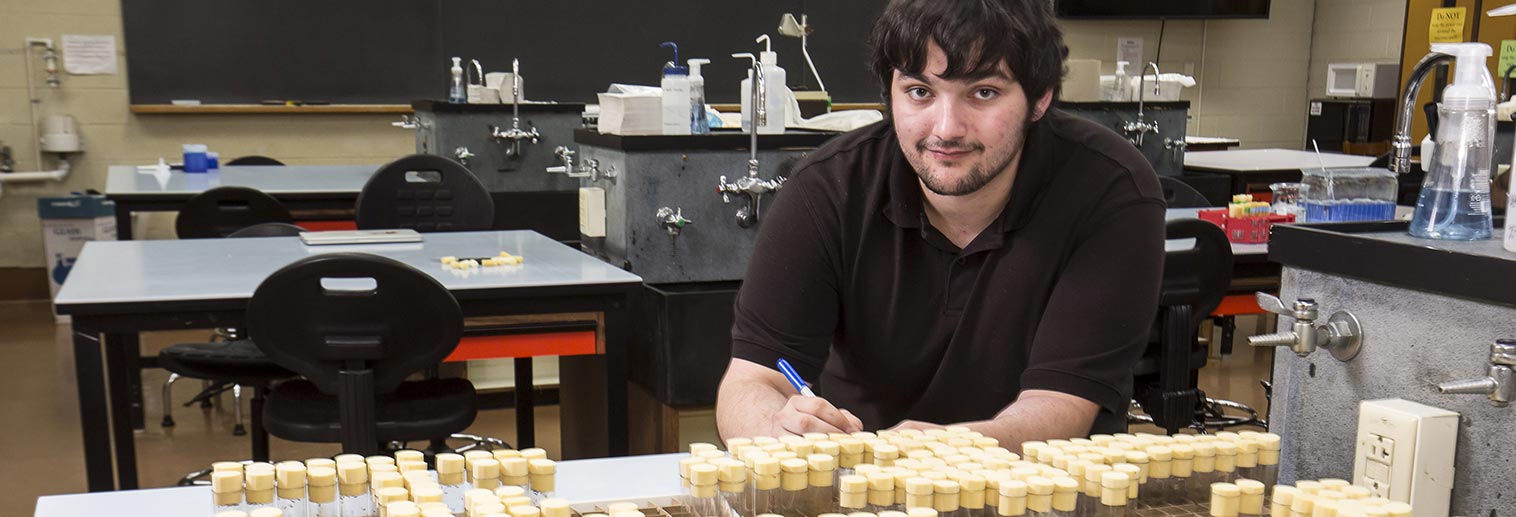Brandon Dimick ’17
“The Effects of a Temperature-Sensitive Mutation on Bang-Sensitive Mutants in Drosophila melanogaster”
Major/ Minor: Biology
Hometown: Jonas, PA
Project Advisor(s): Dr. Christopher Jones
Briefly describe your project.
My project aimed to analyze the effects of the temperature-sensitive mutation, no-action-potential, on seizure producing bang-sensitive mutations. Bang-sensitive mutations cause seizures in Drosophila melanogaster when they are exposed to certain stimuli such as shaking, banging, temperature changes. etc. This class of mutations has phenotypes similar to mammalian seizures. It was worth analyzing how no-action-potential (a mutation which causes paralysis in D. melanogaster at restrictive temperatures due to a decrease in action potentials) affects the phenotypes of various bang-sensitive mutations through various parameters such as seizure frequency, seizure duration, etc.
Why did you decide to turn your idea into a SOAR project?
My faculty mentor, Dr. Christopher Jones, suggested this idea to me after previous research.
How did your faculty advisor guide you through your research?
Dr. Jones has taught me many techniques that are pertinent to me as an aspiring geneticist. These include how to analyze and produce crossing schemes, how to use balancer chromosomes as a tool in bringing together chromosomes prone to recombination, etc.
What has been your biggest obstacle so far?
The biggest obstacle by far was collecting virgin flies. After eclosing, female D. melanogaster individuals have a time-period of ~8-12 hours where they will remain virgin. This means that females must be separated from males within this time window. I had to manage my time so that I or someone else was present every 8-12 hours, if possible, to collect virgin females.
What has been your biggest takeaway from this experience?
Genetic research using D. melanogaster is a time consuming process, but it is very rewarding nonetheless. My experience through SOAR has definitely benefitted me as I continue on my path to becoming a geneticist.
What was the result of your project?
I have collected control data from pure bang-sensitive specimens. I am analyzing eight different bang-sensitive mutations, and I have collected control data for all eight. I have also successfully brought together the bang-sensitive mutations and no-action-potential, and I am in the process of setting up persistent populations that will be analyzed in the future to collect experimental data.
Will you expand on your research after this summer is over? If so, where would you like to see it go?
I plan on continuing this research through either an independent study or honors project. I hope to collect experimental data from bang-sensitive/no-action-potential hybrids as well as expand my control data in the future.
In your own words, how do you feel about being awarded this opportunity?
I am glad that I was awarded the opportunity to conduct research through the SOAR program here at Moravian University, and I believe it is a great opportunity that other students should take advantage of. Through research, you are able to apply what you have learned in the classroom in a “real-world” scenario, and it gives you a great sense of accomplishment when all is said and done.

